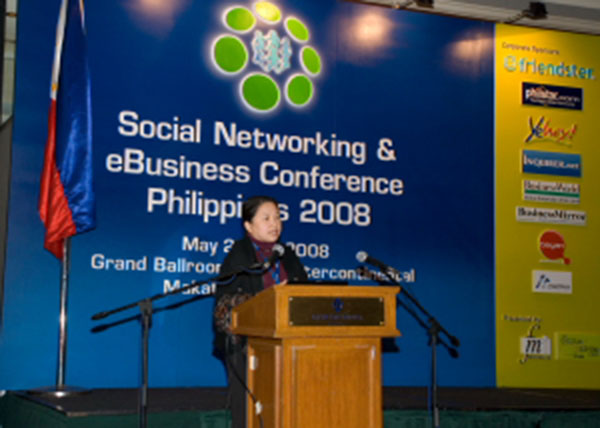E-Government and E-Policies
These are the articles and updates I’ve written on e-government developments.
E-Commerce Policies and E-Government Growth in the Philippines (handout access to club members)
Speaker: Dir. Maria Lourdes Yaptinchay, Supervising Director, Department of Trade and Industry E-Commerce Office
An update on e-commerce policies approved and for ratification to push the growth of e-commerce in the Philippines. Government e-commerce transaction growth in dealing with stakeholders, citizens, customers, and businesses was also discussed.
January 7, 2009
THE Philippine outsourcing industry will be put on focus once again as we all look forward to the 9th E-Services Global Sourcing Conference and Exhibition on Feb. 9 and 10 at the SMX Convention Center, Pasay City.
Internet and Mobile Advertising Code of Ethics
September 17, 2008
The Internet and Mobile Marketing Association of the Philippines (IMMAP) recently released its Internet and Mobile Marketing Code of Ethics that aims to create a standard for Philippine practitioners to observe and be a means for self-regulation. This policy paper is due for ratification and recognition by the AdBoard of the Philippines. Once done, all Internet and mobile advertising industry complaints shall be referred to IMMAP for resolution.
Filing an NTC consumer complaint
July 15, 2008
Last May 6, 2007, the National Telecommunications Commission issued Memorandum Circular No. 05-06-2007 that further explains the agency’s consumer protection guidelines. This policy was created in response to request for clearer guidelines on consumer complaint handling that extends to services of telecommunication entities, value-added service (VAS) providers, like Internet service connection, mobile phone and Internet-related prepaid services, among others.
Telecommunication data log retention
June 15, 2008
Telecommunication entities, including value added services and content providers, have important obligations to be transparent and fair to consumers. It is important for users of these services to know their rights and exercise them whenever necessary.
Making government compliant to the E-Commerce Law
May 19, 2008
To say that a government agency is compliant to Republic Act 8792 or the E-Commerce Law means that the agency accepts electronic filing, issues electronic approval or permits, accepts electronic payment (for those that collect fees), and issues guidelines for the conduct of such with consultation with their constituency.
Which is Superior – Law or Executive Order?
April 17, 2008
The conflicting provisions between the E-Commerce Law and Executive Order 269 creating the Commission on Information and Communications Technology have created a bottleneck in the implementation of e-government and e-commerce in the country.
Accountability in P10-B e-Government fund
April 8, 2008
The Commission on Information and Communications Technology, under the Office of the President, is currently working on a roadmap for the information and communications technology sector. I consider this a welcome news, but at the same time, vigilance must be exerted to ensure that this gets done with the interest of the Filipino people in mind.
February 21, 2008
AFTER the passage of the Philippines E-Commerce Law (Republic Act 8792), there were many efforts by various interest groups, individuals, and even government agencies, pushing for the passage of information technology (IT)-oriented legislation. Some of them, in fact, are meant to update the E-Commerce Law.
October 26, 2006
I recently came across an article that quoted former Commission on Information and Communications Technology (CICT) commissioner Ver Pena, who expressed his disappointment on various government agencies that are supposedly responsible for pursuing e-government programs in the country.
Government e-payment guidelines
March 2, 2006
The Department of Trade and Industry, Department of Finance and Bureau of Treasury are currently drafting an E-Payment Guideline that government agencies can use to accept payments from citizens and businesses electronically.
Challenges in running a telecenter as a business
February 2, 2006
The pressure of bringing information and communications technology (ICT) to the grassroots triggered the establishment of telecenters or community e-centers (CECs) in rural areas of various developing countries. Telecenters are either government, private or non-government organizations (NGOs) that seek to provide Internet facilities where citizens can access the Internet at no or minimal cost.
Philippines #23 in 2006 Waseda University e-Government Ranking
December 19, 2005
The Waseda University Institute of e-Government has released the result of its recently concluded 2006 Waseda University e-Government Ranking. The Philippines ranked #23 out of 32 countries evaluated in the study.
Need for a VAS Board to handle complaints
September 25, 2003
VAS or Value Added Services cover those offerings on top of basic telecommunication facilities. These include your Internet access, text messaging and other forms of services. Nearly everything online and applications on your mobile phone can be considered as VAS. What worries me though is that despite numerous technologies being offered on a regular basis, the protection of the consumer is always overlooked. The latest NTC Wi-Fi circular did not have any provision on where consumers can file their complaints, if any.
July 10, 2003
The common reason used to justify the creation of DICT is that we have lagged behind our neighbor countries for not having one. My question is, does having a DICT make us better or less of a nation? Will the creation of this department create jobs and put food on our table? Can it perform tasks that none of our existing government agencies can do? Whose agenda is really being satisfied here?


Leave a Reply